INTRODUCTION
Here's a scenario: You've just been hired to produce the United State's first ever Rugby Sevens World Cup.
What you do? Where do you start? How do you staff your team? How do you build excitement around an event like this? I have so many questions and ideas of course.
But... Let's go over some basics first:
ONE: I'm going to assume you know what Rugby is. If not, I suggest taking some time off and traveling a little bit.
TWO: I'm going to assume you don't know what Rugby Sevens is, so...: Start Here.
Or just take it from me, it's one of the most exciting, fast paced, high scoring, hard hitting sports out there. Interestingly enough, it's one of the fastest growing sports in the US as well. And I can tell you it is a sport that is made for the fan experience.
If you're still not 100% sure what I'm talking about, just watch this 1 minute video (and yes those are thousands of people in costumes)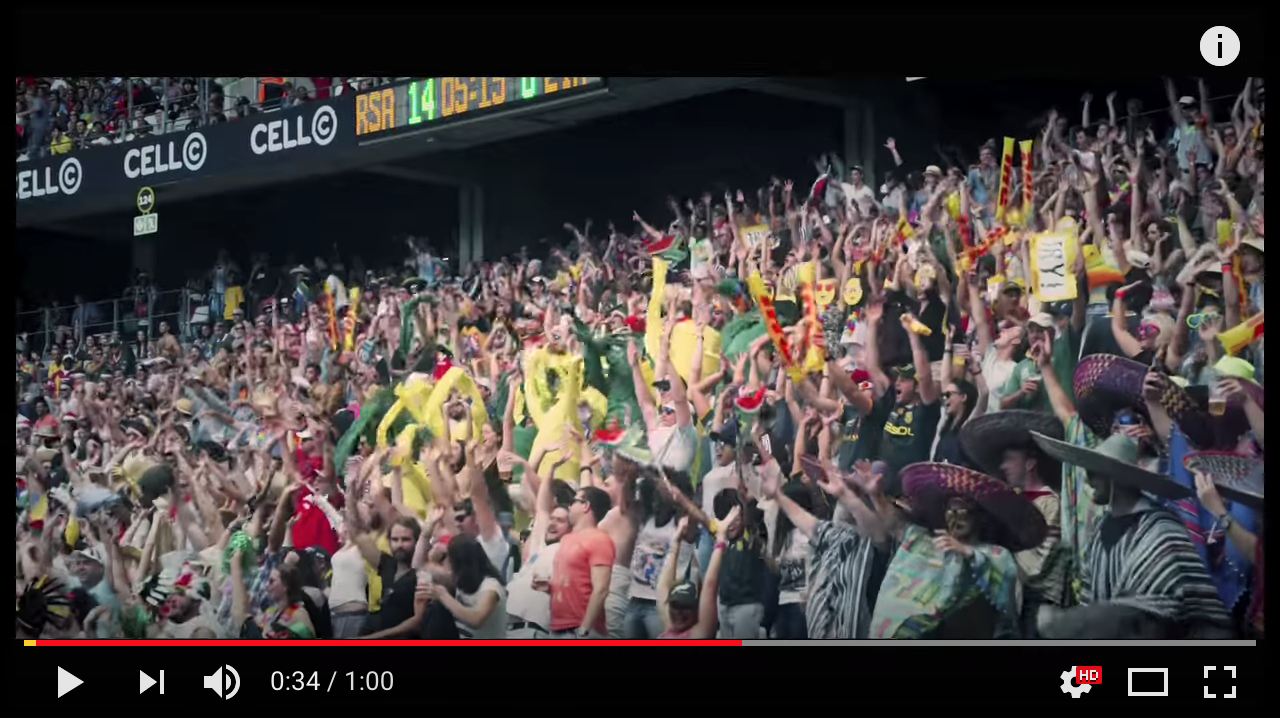
So... with the Rugby World Cup Sevens coming to San Francisco in 2018, I thought it would be a great time to catch up Rosie Spaulding, the World Cup's Genenaral Manager.
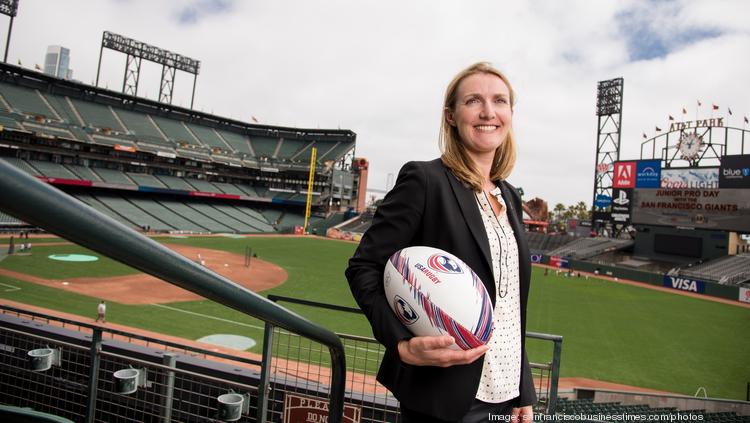
Photo cred: The Business Journals
LET'S SET THE SCENE
She's multi-talented and multi-tasked with securing partnerships, expanding community relations, creating a ticketing strategy, and fulfilling a fun fan experience that will literally bring thousands of people worldwide to San Francisco. She's a perfect fit to oversee this major event.
We can all learn a thing or two from Rosie, and here's what I wanted to get out of my interview with her:
- What production challenges she's faced with these large-scale, international events.
- How she keeps her team organized during the planning and execution phase.
- Advice on how to approach a job and role like this.
- How technology is impacting the major event world.
- What top three traits she looks for when building out her team.
- Her career advice and more.
Rugby World Cup Sevens 2018 STATS
Number of tickets sold already: 45,000
Number of men's teams competing: 24
Number of women's teams competing: 16
Rugby World Cup Sevens 2018 location: AT&T Park—home of the San Francisco Giants, in San Francisco, July 20-22 2018
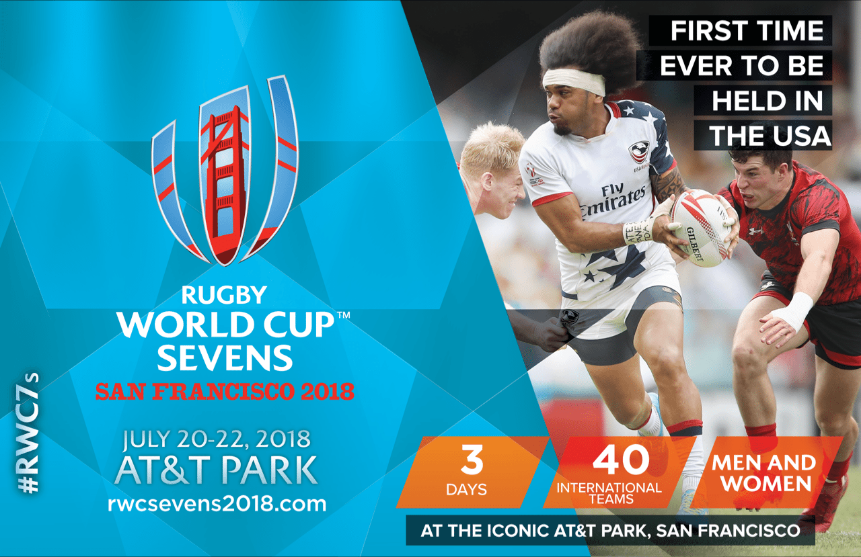 Photo cred: Rugby World Cup
Photo cred: Rugby World Cup
So where did you grow up?
I grew up in a very small town in Cornwall, in the far southwest corner of England, by the beach. I've been in the U.S. for eight years now—we just moved to the coast outside of San Francisco. My husband and I surf and mountain bike as much as we can.
What was 15-year-old Rosie like?
I was into music, sport, and travel—on the sport side, I was particularly into running and eventing (an equestrian sport) as well as attending live music events and traveling around the world whenever I could.
If you were a piece of event equipment, what would you be and why?
Probably a radio, just because communication is at the heart of everything that I do. There are so many stakeholders involved in the successful planning and execution of major events.
When did you know you wanted a career in the event world?
Well, I didn't start off in the event world. One of my early jobs was working for the BBC Natural History Unit. But I've always enjoyed sports, and an opportunity came up for me in 2003 when the Olympic bid process was happening. I jumped at it—that was my start into the event world and I have never looked back.
How much did you know about the sport of rugby sevens before this job?
I grew up around fifteens rugby. Rugby is a big sport in the UK, but not as much here in the U.S. I think that's one of the reasons I'm excited about this project, because it's an emerging sport here in the U.S. on the brink of becoming much larger—similar to the way soccer was ten years ago.
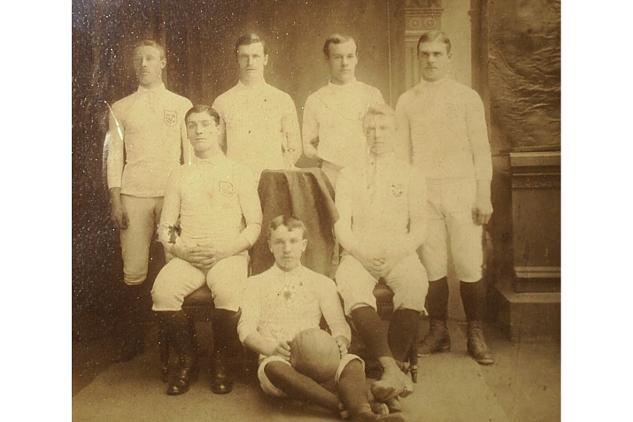
Rugby sevens was first created in 1883 but wasn't recognized as an Olympic sport until 2016 in Rio. Photo cred: Rugby World Cup
Now that rugby sevens is an Olympic sport, it's raised the profile that much more. It's fast, fun and fairly easy to understand. I think it has a real chance here in the U.S. Rugby has definitely seen a lot of growth lately, and is now the fastest growing team sport on college campuses.
You know rugby, right?
That's right. I played rugby at Cal in college years ago. I actually started out playing sevens.
That's fantastic. I think we are at a tipping point for rugby here in the U.S. and the success of Rugby World Cup Sevens 2018 can really help.
It's a really fun sport. The viewing experience is even better. I've actually been to the Hong Kong Sevens and I will tell you it was one of the coolest events I've ever attended.
I went this year as well! It is a blast. I'm excited to bring that level of excitement to San Francisco.
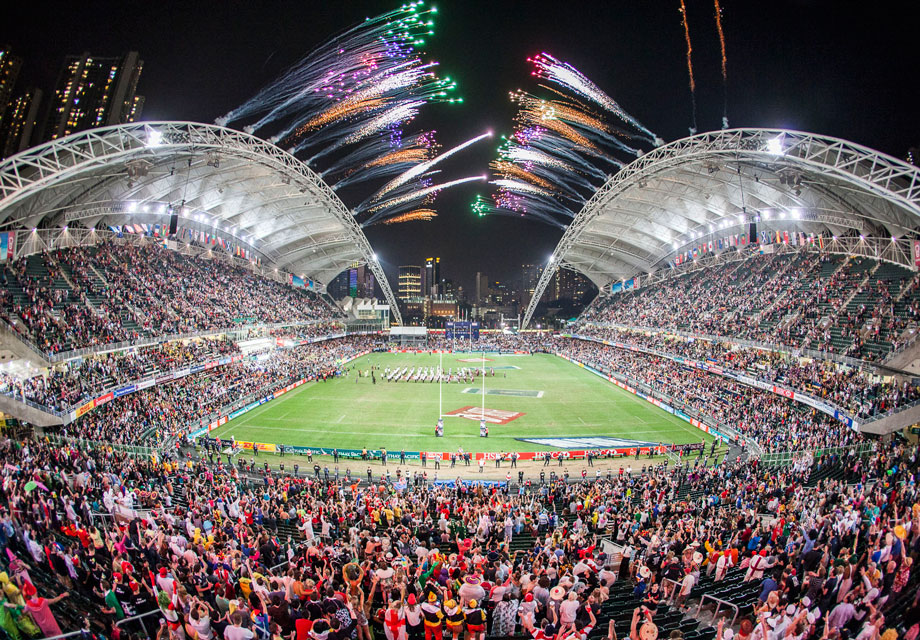
Hong Kong stadium. Magical. Photo cred: D'Marge
So when you took the job, what were the first three priorities you wanted to accomplish?
My priorities were to set a vision, goals and objectives. I look at everything I do as a project. Then I began developing a project plan and building out our team. Next step was to make sure we consistently engage with all key stakeholders to achieve alignment on that vision.
"I look at everything I do as a project." 
How long does it take to setup the initial project management process? Obviously, it's ongoing, but I'm curious.
Yes, it is ongoing, but laying the foundation for this event took probably six to eight weeks.
What are the top three production challenges when hosting an event like the World Cup? You've worked on a number of large events, but are there similar production challenges?
It's a challenge to help each stakeholder obtain their objectives. Each has unique, and sometimes conflicting, needs. Whether it's from the competition side or broadcast side, or looking at it from the sponsor or venue perspective, all of those are equally important and critical. Security is also a big priority—and becoming far more challenging from both a physical security and cybersecurity perspective.
And how do you create an experience that captivates new fans as well as engage the ones that you have already? This is one of the reasons I enjoy my job so much. One of the biggest challenges we're looking at on a daily basis in the U.S., is, "What is rugby? What is rugby sevens?" There's an education and awareness process with a sport like this.
"This is one of the reasons I enjoy my job so much." 
When it's all said and done, what do you think you're going to be most proud of?
Filling the stadium and putting on a fantastic fan experience for one, but what's also really important to me is how we can leverage this event to increase participation and awareness of rugby long term. If we can achieve that, that would make me most proud. As well as being able to make a difference regionally by supporting local organizations and non-profits.
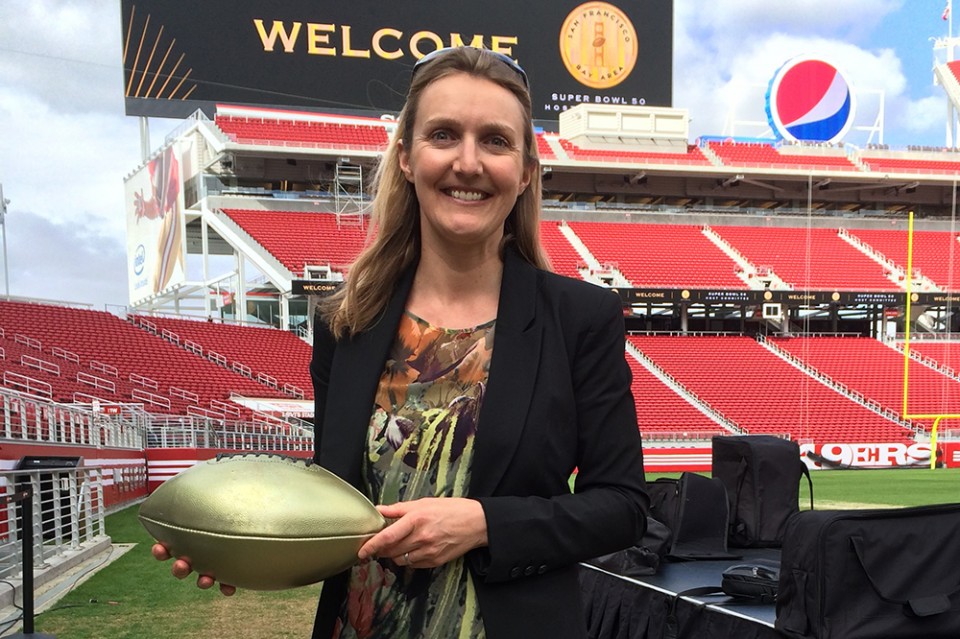
Photo cred: Sharp Heels
What would you say is the biggest difference between the production of a Rugby World Cup versus the Super Bowl versus the America's Cup, or any of the larger events you've worked on?
I think each event has its own challenges. For example, sailing is often perceived as elitist. It's difficult to understand. So how do you take a sport like sailing and the America's Cup and break it down to be more appealing to a non-sailing audience? That was the biggest challenge.
With the Super Bowl, the biggest challenge was that we had 70,000 people that could go to the game and we wanted to give everyone a taste of Super Bowl 50. That was one of the main driving factors behind the creation of Super Bowl City, which was our nine-day free, public fan park that we built and saw one million people come through in a week.
One of our bigger challenges with rugby is trying to raise awareness of the sport. Much of our marketing is focused on engaging folks in the Bay Area that might not know about rugby and rugby sevens, and how to capture their imagination and encourage them to come to the World Cup next summer.
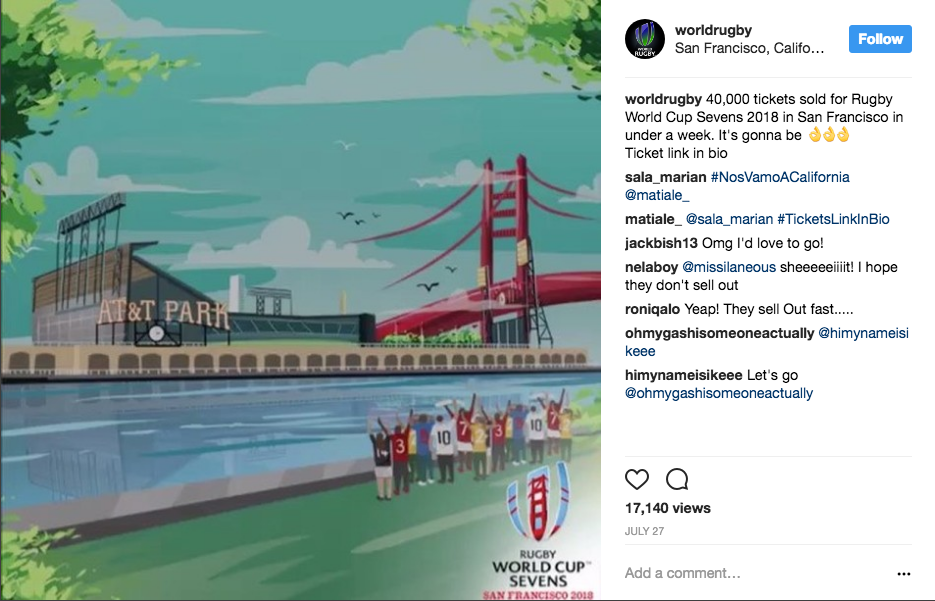
From @worldrugby
I'm sure you're in all kinds of meetings, but do you have any standing meetings and is there a typical structure to try to keep them moving quickly?
At this stage, we have standing meetings with our key partners such as World Rugby, the San Francisco Giants (our venue and ticketing partner for this event) and commerical partners as they come on board.
Internally, we meet as a team every Monday morning for 30 minutes to map out the week ahead and list our priorities. We try and keep the team meetings quite short and sharp and just focused on core points.
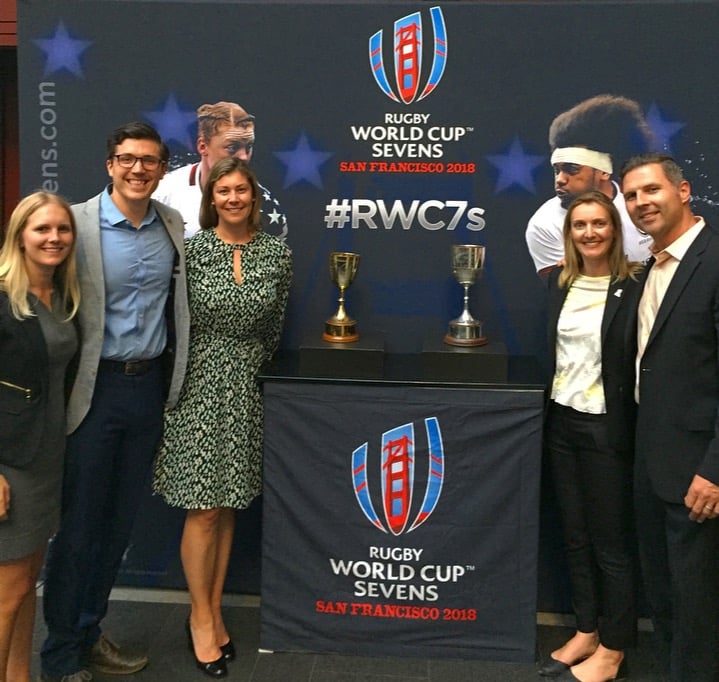
Courtesy Sarah Hawkins, Rugby World Cup Sevens
Do you have any specific routines that help you be more productive each day?
I like to work out and run. Being active helps clear my mind and makes me more focused. Also, coffee in the morning, staple.
How do you think technology will change this job of yours in ten years, if at all?
I think technology can greatly impact the experience operationally—to give just one example—driverless cars or hyperloop transportation. Not to state the obvious, but it's the whole experience that creates an event. What touchpoints will stakeholders and fans experience? How are they going to get there? How do they know how they're going to get there? Transportation will greatly evolve over the next decade.
I'm sure the way that we view and digest content (and therefore sport), will contine to evolve but one thing that I don't think will change is that desire to go to a sporting event. No matter how much you can do virtually, you can't recreate that feeling and incredible atmosphere that you get from being part of a major event. So whether it's a FIFA World Cup or an Olympic Games or a Rugby World Cup, this real live experience of being with other fans is something you can't replicate.

The famous haka from New Zealand's All Blacks. Be afraid. Be very afraid. And be there in person. Courtesy of Rugby World Cup.
If you could automate any aspect of the production process, what would it be?
Definitely some of the operational pieces, because when they're done well, nobody knows about them. When you go to a well-produced event, the operational elements aren't something you even pay attention to. But if an event doesn't deliver on the transport, the parking, the signage or the fan journey, it becomes the talking point. So the operations need to be completely seamless to create a positive fan or guest experience.
I'd love to see accreditation become more automated. That's a huge one. Credentialing often thousands and thousands of people for an event is still not a straightforward process. It normally involves two or three different groups or companies to deliver.

If interested in streamlining your credentials, comp tickets and any other aspect of your logistics and production process:
www.LENND.com
What are the top three traits you look for when hiring for your team?
The single most important trait to me is a good attitude. I'd rather hire someone with the right attitude over experience. Experience is important, but having the attitude of, "Nothing's beneath me," and the motivation to jump in to get things done is key. You never know at any one point what you might need to make happen. Putting the team first and having the right attitude to go beyond your job description is important in events.
You also need to be organized—being able to manage multiple tasks at any one time, prioritize and respond to change. Then, lastly, the ability to communicate well. It's so important, especially with so many stakeholders involved at every level.
What do you look for in a partner agency or production company or vendor? Is there anything across the board that jumps out at you?
I think one would be creativity. If I'm going to an agency, I like to go to someone that's thinking about things in a different way than me. I love the additive brainstorming process. And I really want the relationship to feel like a partnership. I look for similar values and just feeling that the group we're working with is an extension of the team.
If your son wanted to get into the event business, what advice would you give him?
You learn many good life lessons from being in this business. But it is pretty much all-consuming. It's fun, but there's nothing 9-to-5 about live events. If he wanted to be in the event business, then being ultra-organized and learning the value of good relationships is key. There's value in what happens outside of work, too. In the beginning, I placed all my emphasis on working really hard and probably didn't give that as much appreciation as I should have done. Relationships that you form outside of work can move you through your career. I was also really impatient at 25-years-old, and eager to move up the ladder—patience is key!
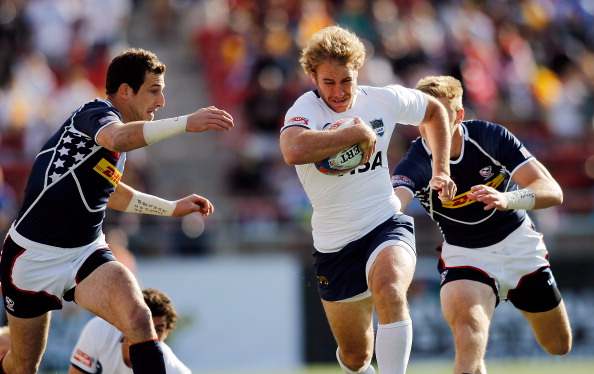
Photo cred: Rugby World Cup
Great advice. What do you think is the number one leadership lesson you've picked up over the years in event production?
From a leadership perspective, one idea that my previous boss taught me at the Super Bowl was, "If you have a burning issue that needs my time today, just let me know in the morning and I will make time for you." That might sound really simple, but it actually meant a lot. Make time for your team—they are your greatest asset.
I'm curious, in your work life, are you insecure about anything, and if so, how do you get through that?
Good question. Well I don't really enjoy being the center of attention, I like being in the background, being the engine that's making things happen. I also realize the importance of stepping into the spotlight now and again. I'm getting more comfortable with it—with time and experience and think, "Oh, okay. I've been doing this for more than 15 years now. I can do it!"
"I like being in the background, being the engine that's making things happen." 
I think that's great. It's honest.
What's really helped me is to imagine yourself as one of your colleagues coming to you with the same concern. As soon as you put yourself in the third person, it all becomes much clearer.
That's interesting, it's a lot easier to give somebody else advice than yourself. If you were to give an event industry state of the union address, what would be the top three topics you'd discuss in your speech?
I'd like to discuss the future trends of our industry and what might happen ten years from now—particularly with rapidly advancing technology. Let's see. I keep coming back to security, but that's a big one. How do we ensure our events are secure while protecting the fan experience?
Then I would discuss the crossover with producing major events and how that relates to other industries and business generally. I still have a hard time articulating what I do to those outside the evens world. So it would be a good opportunity to help translate what we do.
Do you have any parting wisdom for those in the event world that are reading this?
Keep an open mind. There's so much detail and so much planning that goes into events, but there's always a curveball. So being able to look at those challenges with an open mind and find creative solutions in high-pressure work environments is a key part of the job.
WHAT IS LENND?
LENND is an event management platform helping production teams streamline their logistics and operations. For early access or if you're interested in a demo contact us HERE.
PREVIOUS INTERVIEWS:
Super Bowl: Kyle Chank, Super Bowl VP of Operations and Logistics (READ)
LA2024 (Part 2): John Harper, COO (READ)
LA2024 (Part 1): Danny Koblin, Chief Bid Officer (READ)
Possible Productions: Michael Figge, Director (READ)
Comic-Con: David Glanzer, Chief Strategy Officer (READ)
SXSW: Hugh Forrest, Director (READ)
Boston Marathon: Dave McGillivray, Race Director (READ)
IMG: Tobias Sherman, Global Head of eSports (READ)
Presidential Inauguration: Steve Kerrigan, Chief of Staff & CEO (READ)
HUKA Entertainment: Rachel Pucket, Digital Marketing and Social Media Manager (READ)
The Adventurists: Dan Wedgwood, Managing Director (READ)
Wasserman Media Group: Zack Sugarman, VP of Marketing & Digital Media (READ)
Electric Daisy Carnival: David Chen, Director of Technology (READ)
Firefly Music Festival: Christiane Pheil, Director of Programming (READ)
Charlotte Motor Speedway: Garrett Carter, Manager of Event Operations (READ)
RiSE Festival: Dan Hill, Co-Founder (READ)
Wanderlust: Heather Story, Senior Director of Event Operations (READ)
New York City Wine & Food Festival: John Trumble, Managing Director (READ)
KAABOO: Taylor Gustafson, Director of Ticketing & Credentials (READ)
KAABOO: Brian Wingerd, SVP of Marketing (READ)
Las Vegas Police Department (Events Division): Rick Nogues, Sergeant (READ)
Los Angeles Marathon: Murphy Reinschreiber, VP of Operations (READ)
BWG: Leo Nitzberg, Co-Founder (READ)
Rock N' Roll Marathon: Ted Metellus, Director of Course Operations (READ)
Governors Ball Music Festival: Tom Russell, Co-Founder (READ)
Superfly (Bonnaroo & Outside Lands): Kat Tooley, Senior Director, Event Production (READ)
Firefly Music Festival: Megan Marshall, Assistant Director (READ)
The Enthusiast Network: Scott Desiderio, VP of Event Ops (READ)
Sea Otter Classic: Frank Yohannan, Founder (READ)
Big Sur Marathon: Doug Thurston, Event Director (READ)
Summit Series: Cara Bubes, Event Director (READ)
Color Run: John Connors, VP of Experience (READ)
TechCrunch Disrupt: Leslie Hitchcock, Event Director (READ)
Boston Marathon: Matt West, VP of Operations (READ)
Academy Awards: Cheryl Cecchetto, Production Director (READ)
RunningUSA: Christine Bowen, Event Director (READ)
Charity Ball & Charity Water: Lauren Letta, Chief of Staff (READ)
Electric Run: Latane "Big Bird" Meade, Co-Founder (READ)
Color Run Australia: Luke Hannan, Event Director (READ)





